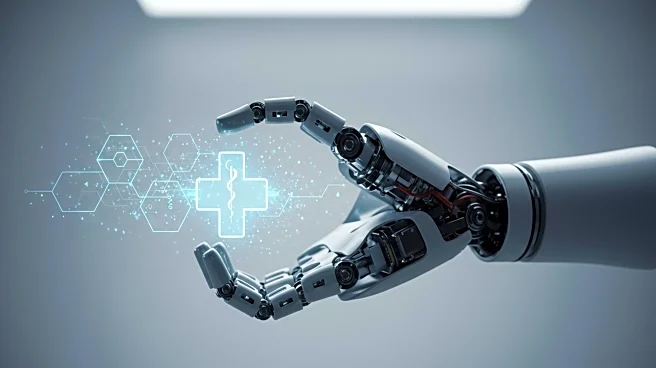What is the story about?
What's Happening?
The integration of robotics and artificial intelligence (AI) in healthcare is significantly transforming medical practices. These technologies are being utilized in various applications such as robotic-assisted surgeries, rehabilitation, and hospital operations. AI-powered robots enhance precision in surgeries, reduce medical errors, and streamline hospital logistics. For instance, surgical robots enable minimally invasive procedures with high precision, reducing recovery times and complications. Rehabilitation robots provide personalized therapy, aiding in faster recovery for patients. Additionally, robotic nursing assistants and disinfection robots are improving hospital efficiency and safety. Despite these advancements, the adoption of healthcare robotics faces challenges including high implementation costs, technical complexity, data privacy concerns, and ethical issues.
Why It's Important?
The adoption of robotics in healthcare is crucial as it promises to improve patient outcomes, enhance hospital efficiency, and reduce medical errors. By automating routine tasks and providing precise surgical assistance, healthcare robotics can free up medical professionals to focus on critical care, potentially lowering operational costs by 15-20%. However, the high costs and technical demands of implementing these systems pose significant barriers, particularly for smaller hospitals and developing regions. Moreover, ethical concerns about replacing human caregivers with robots and data privacy issues need to be addressed to ensure trust and compliance with regulations. The successful integration of robotics in healthcare could lead to more accessible and efficient medical services globally.
What's Next?
As the healthcare robotics market is projected to surpass $20 billion by 2025, driven by the demand for surgical robots and automated assistance, stakeholders must address the existing challenges to facilitate wider adoption. This includes investing in training for healthcare professionals, ensuring robust data protection measures, and developing cost-effective solutions to make these technologies accessible to smaller healthcare facilities. Additionally, ongoing discussions around the ethical implications of robotics in healthcare will be essential to balance technological advancements with patient trust and empathy. The future of healthcare will likely involve a collaborative approach where human expertise and intelligent machines work together to enhance patient care.
Beyond the Headlines
The rise of healthcare robotics also highlights broader societal and ethical considerations. As robots take on more roles traditionally held by humans, questions about the limits of automation in healthcare and the potential impact on employment in the sector arise. Furthermore, the concentration of advanced robotics in wealthier countries could exacerbate global healthcare disparities, necessitating international cooperation to ensure equitable access to these technologies. The ongoing evolution of healthcare robotics will require careful navigation of these complex issues to maximize benefits while minimizing potential drawbacks.















